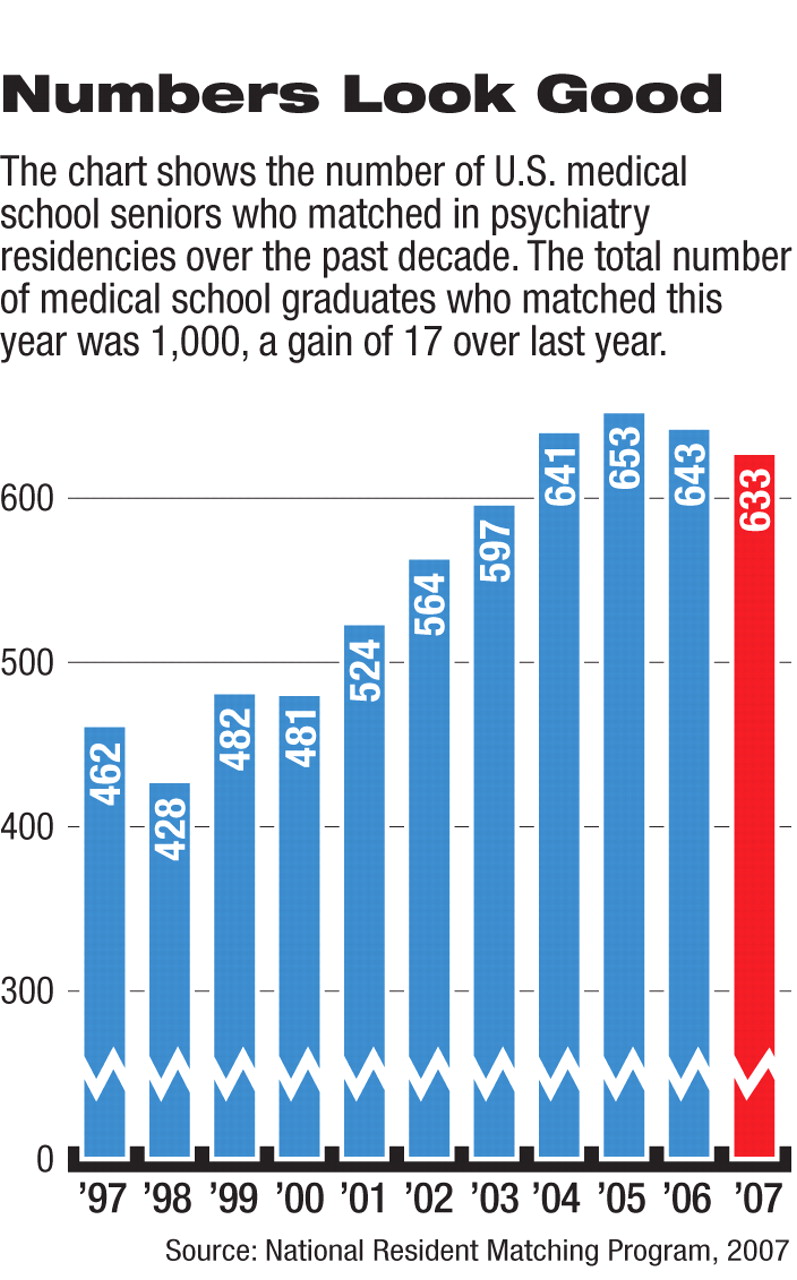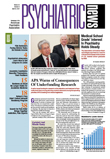Exactly 1,000 medical school graduates will enter PGY-1 general psychiatry residency programs this summer, according to the National Resident Matching Program (NRMP).
Of those, there were 633 U.S. medical graduates who “matched” into psychiatry residency programs around the country. That number is down from last year's figure of 643 (see
chart).
The 1,000 graduates entering psychiatry residency are up from 983 last year, with a larger percentage of this year's entering class consisting of international medical school graduates, Canadian students, U.S. students who graduated in previous years, and other applicants who are not matching directly from U.S medical schools.
American medical school graduates comprise 59 percent of new PGY-1 psychiatry residents, compared with 62 percent last year. A total of 1,057 psychiatry positions were offered this year, leaving 57 positions in 26 programs unfilled. The NRMP says that 180 psychiatry programs participate in the match.
Match results can be an indicator of career interests among graduating medical school students. Some other highlights from this year's match include the following:
•
The number of family medicine residency positions available in the 2007 match (2,603) continued to decline this year—there were 100 fewer positions available than in 2006, and more than 500 fewer than in the 2000 match. This year, 88 percent of the available positions in the match were filled.
•
More than 98 percent of available internal medicine residency positions were filled this year, continuing a three-year increase— 56 percent of those positions were filled by U.S. medical school seniors.
•
General surgery continues to be a very competitive specialty. All but two of the 1,057 available positions were filled, 78 percent by U.S. medical school seniors.
•
Interest in obstetrics/gynecology residencies has been increasing over the past few years. In the 2007 match, 99.5 percent of the available positions were filled, nearly 73 percent by U.S. medical school seniors.

APA Area 4 Trustee Sidney Weissman, M.D., a past president of the American Association of Directors of Psychiatric Residency Training who has maintained a long-time interest in workforce issues, noted that interest in psychiatry appears to have reached a plateau in recent years.
Approximately 4 percent of U.S. senior medical school students have entered general psychiatry programs for the past five years, he said.
Weissman noted that the Association of American Medical Colleges has urged an increase of 30 percent in the number of U.S. medical school graduates by 2020 and is anticipating the building of new medical schools to accommodate the increase.
“We will need to maintain and encourage interest in psychiatry as the nature of the medical school student population changes,” he said.“ We need to maintain as a minimum our current 4 percent interest level with the new group of students.”
The NRMP is a private, not-for-profit organization established in 1952 to provide “an orderly and fair mechanism” to match the preferences of applicants to U.S. residency positions with the preferences of residency program directors for those applicants. The NRMP is sponsored by the American Board of Medical Specialties, AMA, Association of American Medical Colleges, American Hospital Association, and Council of Medical Specialty Societies.
In January the United States Supreme Court let stand two lower-court decisions dismissing the lawsuit Paul Jung, M.D., et al. v. Association of American Medical Colleges, et al. The lawsuit, filed by three physicians in May 2002, alleged that the NRMP, its five sponsoring organizations, and 29 teaching hospitals violated federal antitrust laws.
In an opinion filed on June 1, 2006, a three-judge panel of the U.S. Court of Appeals for the District of Columbia upheld the U.S. District Court's August 2004 dismissal of the plaintiffs' complaint. District Court Judge Paul Friedman had concluded that the plaintiffs' antitrust claims were barred by the Pension Funding Equity Act of 2004 that exempted the NRMP from federal antitrust laws.
The Supreme Court's decision not to hear the case brings the litigation to an end. “We are most gratified by the Court's ruling,” said NRMP President Paul DeRosa, M.D., in a statement. “Now we can focus all our efforts on helping young physicians explore their best options for completing their medical education.” ▪

